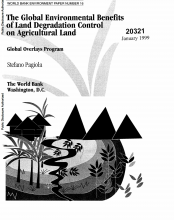Land Library Search
Through our robust search engine, you can search for any item of the over 73,000 highly curated resources in the Land Library.
If you would like to find an overview of what is possible, feel free to peruse the Search Guide.
/ library resources
Showing items 1 through 9 of 29.The note focuses on the global effects of land degradation, but emphasizes other important levels of land degradation: at the field level, it may result in reduced productivity; at the national level, it may cause flooding, and sedimentation; and, at the global level, it can contribute
This research report on India addresses an important policy issue faced by policy-makers in many developing countries: how to allocate public funds more efficiently in order to achieve both growth and poverty-reduction goals in rural areas.
An international conference was held in Amman, Jordan in September 1997 to examine mounting problems of poverty and environmental degradation in the low rainfall areas (LRAs) of the eight Mashreq and Maghreb countries of West Asia and North Africa (Iraq, Jordan, Lebanon and Syria from the Mashreq
Based on a survey of 60 villages in Western Ghana, where cocoa is the dominant crop, this study explores evolutionary changes in land tenure institutions on women's land rights and the efficiency of tree resource management....With increasing population pressure, customary land tenure institution
This paper examines the equity implications of the evolution of land rights from communal land tenure to individualization in customary land areas in Western Sumatra.
Land tenure institutions in customary land areas of Sub-Saharan Africa have been evolving towards individualized ownership. Communal land tenure institutions aim to achieve and preserve the equitable distribution of land (and hence, income) among community members.
This study attempts to identify the impacts of land tenure institutions on the efficiency of farm management based on a case study of paddy rice and upland cinnamon production in the Kerinci Valley in West Sumatra, where most of Indonesia’s cinnamon is produced.
The American bias that privileges owners over tenants has its roots in early US history, in the colonial practices of limiting suffrage to property owners, and in the formation of a Constitution that protected the propertied minority from the propertyless majority.








